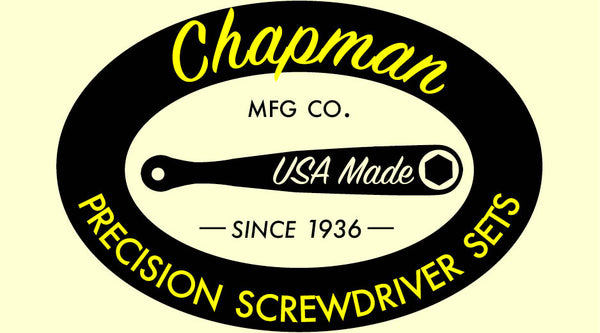Bits That Don't Screw Up
|
|
|---|
Chapman MFG Screwdriver bits vs. other screwdriver bits
Each bit has ears/ring stops with ball detent to hold the bit securely in our famous midget ratchet, screwdriver handle or spinner Bits have knurled ends for finger tightening and are stamped with the part # Chapman bits are precision milled to tight tolerances with flat edges, sharp corners and no burrs for a snug screw fit All bits are machined from USA steel and heat treated with a black oxide rust inhibitor finish |
Minimize Damage With Chapman Bits
1. Each Chapman bit is designed for use within a specific torque range. Small bits are designed for less torque, large bits are designed for more torque. Chapman tools and bits are specifically engineered for hand use. 2. Chapman bits are tough and springy, not brittle. We use fine alloy steel heat treated with a black oxide finish. Each bit reaches its specified hardness that is not too hard to shatter nor too soft to twist. 3. Our smaller bits - .05", 1/16" 1.5mm, 2.5mm & slotted CM-88, 89, 90, etc. - are designed to prevent damage in applications where the screw is more valuable than the bit. When excess torque is applied, our bits are designed to break before marring an irreplaceable screw. If a screw is seated so tightly that the bit starts to bend, stop immediately, as additional force will break the bit, mar the piece, or rip off the screw head. 4. Our famous Chapman Midget Ratchet provides approximately 4 times the leverage of a large screwdriver. The ratchet provides more torque than small screws are designed for, so use gentle but even pressure to loosen small screws. A small size bit can be twisted if sufficient force is applied. Use the knurled ends of our bits or the spinner top to apply finger pressure. |
Protect your Equipment With Chapman Bits
1. Some customers break or strip bits (e.g., slotted #88, #89 ,#90 and Star S6, S8) when working on their firearms or scope rings. Considering threadlockers, tool torque ranges, and screw fitting can prevent this. 2. Use Loctite Purple 222 instead of the commonly (INCORRECTLY) recommended Loctite Blue 242. Purple Loctite 222 is for fasteners under 1/4". Many gun manufacturers and gunsmiths use Loctite Blue 242 for fasteners 1/4" to 3/4", yet firearms do not have fasteners larger than 1/4". More information on Loctite 3. Since our bits are made to specific tolerances, they must be used in the correct size screw. The working end of the bit must bottom into the screw slot and the length and width must fit snugly. That is why we offer slotted bits with 12 different widths and thicknesses! 4. Many gun screws are designed and treated to never back out, so removing them with any screwdriver is futile and they need to be heated or drilled out instead. If a bit breaks, we have open stock parts at reasonable prices. |
